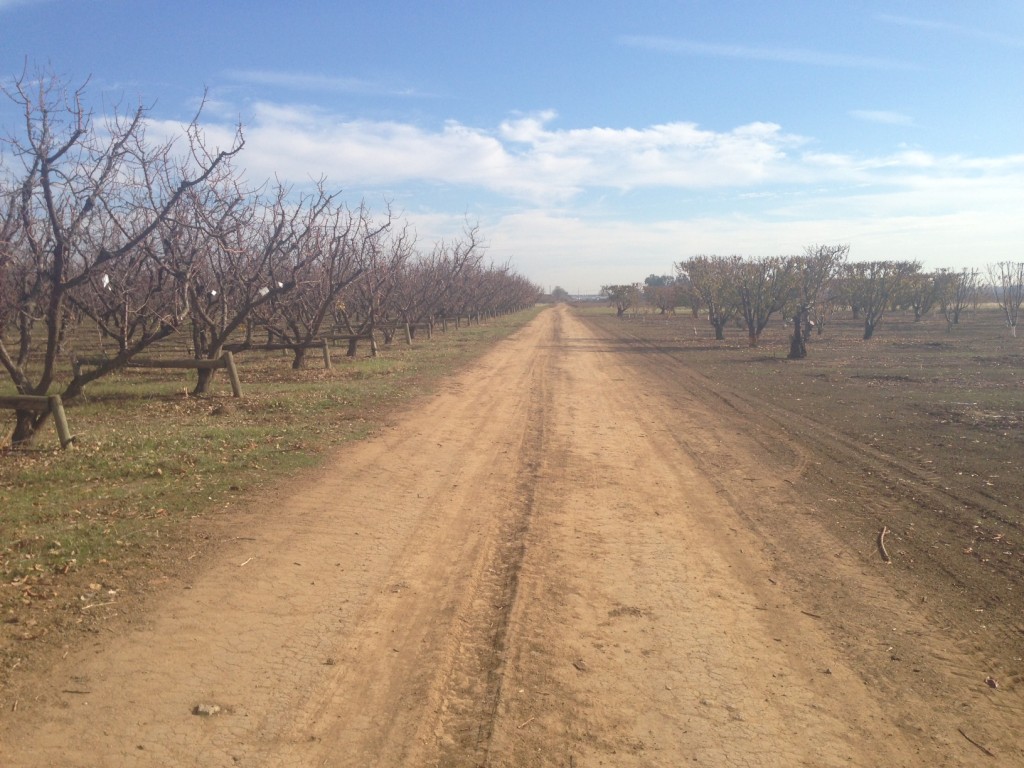

In the southwestern part of the orchard there is a broad farm road that divides our farm from a neighbor. Though both farms are home to rows of trees, the contrast between the two orchard blocks is quite striking.
The most immediate visual difference is the tops of the trees. Our neighbor’s trees are uniformly cut across the top so that the uppermost canopies look flat like a tabletop. The branches of our trees reach upward to the sky at different heights giving the trees a more organic appearance. The interrows also differ in that the ground is barren between the trees of our neighbor's farm, whereas a riot of different plants grow in our orchard (though they are quite short during winter months).
There are several different values that play into the management of our orchard. At Frog Hollow, we are committed to growing the best tasting, highest quality fruit possible. Everything we do in the orchard is driven by that goal. Conse- quently, this goal lays the foundation for other values we hold very dear – creating healthy and biologically alive soil and keeping our people employed.
The tabletop appearance of our neighbor’s trees is a result of a mechanical pruner that has a helicopter like roto-blade that chops off the top of the tree at the same level. We use a more meticulous hand labor approach to pruning. Our tree team prunes out individual branches throughout the entire tree in order to let light in at the top, but also so that every branch gets an equal share of light and energy from the sun. We spend a lot more money on labor, hand pruning 30,000 trees a season, but our Tree Team stays busy throughout the winter months and you enjoy delicious sun-ripened fruit from every branch.
There’s an industry term called a “clean orchard”, which to many in the world of farming, is a good thing. A clean orchard is one that is devoid of weeds. A weed free orchard is most often achieved by chemical herbicide application. Herbicides kill weeds but they also kill biological life in the soil. We take pride in our “weeds” – a wild and chaotic riot of grasses, vetches, clovers, and leguminous plants on the orchard floor. The root systems of these plants form a symbiotic relationship with the microorganisms in our soil and provide aeration that benefits soil structure. When we weed wack (more hand labor and employment for our year round Ground Team) the waist high riot of plant life down during summer months, a rich layer of organic matter becomes available for the microorganisms in the soil to decompose, thereby transferring nutrients to our soil and continuing the cycle of our soil food web. Our trees are happy and so are we!
Ultimately, some of the choices farmers make in their production systems are tied to their marketing channels. Our neighbor’s cherries will be picked by contract laborers and then sold to a big cherry packer in Stockton. The cherries will then be sold to a large buyer the farmer will never know. The production methods used by many farmers are geared toward producing a crop at the lowest possible cost because in the end they won’t be paid much for it. At Frog Hollow, we are going to do the very best we can to produce excellent tasting fruit, tended by a year round crew, using methods to sustain our soil and planet. We can do this because of you! Our prices are set in accordance to what is required to cover our costs and keep our farm in business. So the next time you take a bite of a juicy and delicious piece of Frog Hollow Farm fruit, give your self a thanks for doing a very important job of supporting us in growing the best fruit we know how to.



